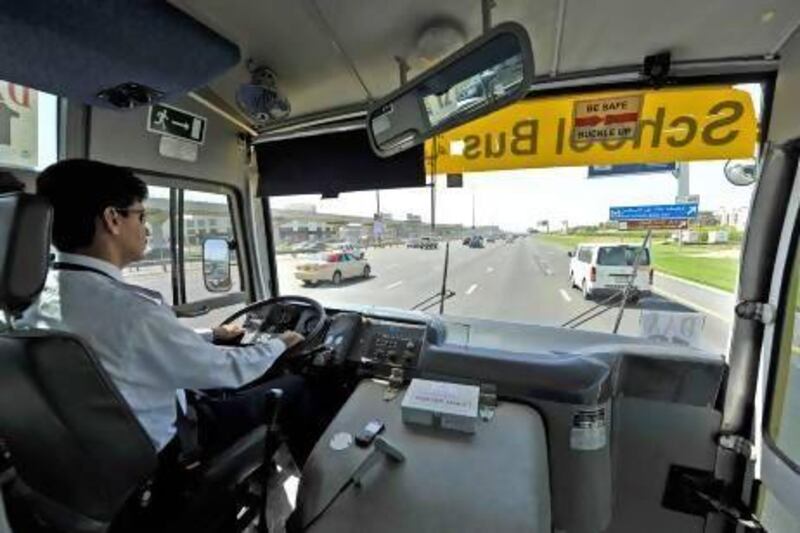DUBAI // Bad driving by car owners is making life a misery for drivers of school and work buses.
Bus drivers say they obey the rules but too many car drivers do not - speeding, weaving between lanes and speaking on mobile phones.
"There are so many rules but people don't really bother. They cut from anywhere to anywhere," said Sohail, the driver of a workers' bus for the past two years.
Ashraf, a driver for an Indian school in Dubai, said angry motorists routinely call his school to complain about buses' slow speed - which is limited by law to 80kph.
"We are required to drive in the two inner lanes and at the set speed limit. But they call and complain that drivers are not going fast or giving way for them.
"They don't bully RTA buses this way. So why not adopt the same attitude towards school buses?"
The aggressive behaviour of other motorists often puts them on edge. "Vehicles flash lights, even in the slow lane," said Rajeev Rajan, 31, who has been delivering pupils to and picking them up from the Wellington International School in Dubai for seven years.
"Even when we stop to pick up children, drivers will keep honking. We feel a lot of pressure despite driving at 80kph."
Mr Rajan drives about 100 kilometres a day in a 24-seater bus.
"People try to overtake us, even on a single lane. I feel very anxious till I drop them," he said.
Noor Khan, 54, a driver for Our Own English High School Dubai, has had similar experiences.
"People don't wait when we have to stop to pick up or drop children. There is pressure to do things fast but we have to do our duty," said the driver with 17 years' experience behind the wheel.
He believes the vehicle licensing departments could address this problem. "Every year when motorists renew their vehicle registration, they could be reminded to go slow for bus drivers and give them preference."
Permission to use the lanes reserved for RTA buses and taxis in Dubai would also save time, and ensure children are not stuck on the roads during peak hours.
"They could include school buses in these lanes in areas like Bur Dubai, where there is a lot of congestion," said Mr Rajan.
All agreed that the Ministry of Labour could intervene to provide incentives for better driving by ensuring better work conditions.
Drivers of workers' buses earn monthly wages of between Dh1,000 and Dh1,500 to work an eight-hour shift that can sometimes stretch to 12 hours.
School bus drivers rarely work more than four to five hours a day, and earn about Dh1,000 more than their colleagues in the white buses.
"Drivers should start at a salary of at least Dh3,500. This could ensure drivers behave responsibly and make them care for the children on the bus," said Mr Rajan.
Abdul Halim, 38, drives buses with a capacity for 50 to 80 passengers for a labour-supply company.
"Now the salary of a labourer and a driver are the same, but we need more skills so shouldn't we be paid more?" he said.
"Workers are paid Dh1,000 and so are we but if the government said our salaries should increase at least to Dh2,000 to 2,500 then we can manage much better, we can send more money home and live a little easier here."
He said prolonged work days caused fatigue and could lead to deadly mistakes. "Drivers are sometimes made to work 16 to 18 hours, then how will they keep their eyes open?" he asked. "We also need rest.
"Fear is in my mind whenever I see a traffic jam. I wonder if it's an accident and who has died," he said. "Anyone who has a heart and drives on these roads will be scared."
rtalwar@thenational.ae







